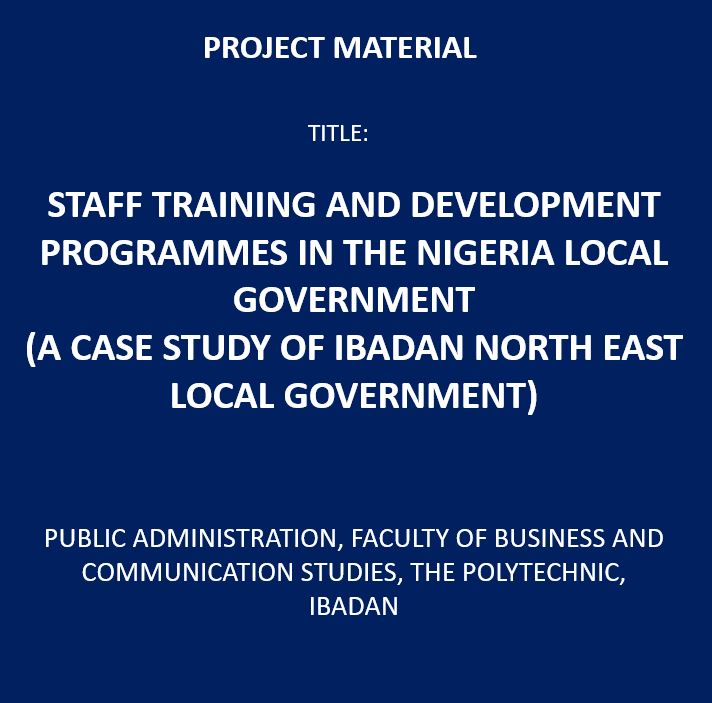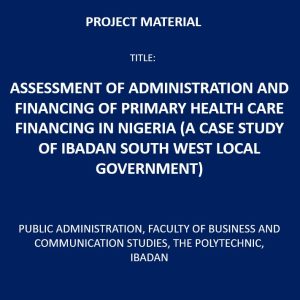Staff Training and Development Programmes in the Nigeria Local Government
₦10,150.00
STAFF TRAINING AND DEVELOPMENT PROGRAMMES IN THE NIGERIA LOCAL GOVERNMENT
- CASE STUDY: IBADAN NORTH EAST LOCAL GOVERNMENT
- NUMBER OF PAGES: 51
- FILE TYPE: DOC - CHAPTER 1-5
- DEGREE: ND
- DEPARTMENT: PUBLIC ADMINISTRATION, FACULTY OF BUSINESS AND COMMUNICATION STUDIES, THE POLYTECHNIC, IBADAN
BACKGROUND TO THE STUDY
Training is widely accepted as a necessary function of managing a large enterprise. It is important to the quality of service and long range staff effectiveness. The ever increasing rate of technological changes, the increasing scope of governmental activities, the ceaseless clamor for social change make it necessary for workers to be prepared for adaptability and coping with the problems of change (Onah, 1995). Chukwuemeka (2004) sees training “as a systematic process of altering the behavior and/or attitudes of employees in a direction to increase organizational goal achievement”. Onah (1995) defined training “as an organized and coordinated development of knowledge, skills and attitude needed by an individual to master a given situation or perform a certain task within an organizational setting”. While the concepts training and development have often been used interchangeably, a line of demarcation exists between the two concepts. Training is a tool and an instruction in a myriad of forms and settings, where both technical and conceptual knowledge and skills are imparted to all categories of workers.
Development on its part is a process of advancing while acquiring skills and experience. Development involves all training and previous job assignments and organizational experiences into a total capability package. Thus, training primarily facilitates development. In the same direction, Akpan (1982), opined that development enables an employee grow on the job, by acquiring experiences and increased confidence as a result of previous and varied on the job responsibilities, the aim being to enable him attain the apex of his chosen career. However, the two concepts would be used interchangeably in this study because their relatedness results to efficiency and effectiveness of staff in any given organization, including the local government system which is the focus of this study.
The necessity of training programs in the local government system will enable local government staffs to efficiently and effectively understand and flow freely with the routine operations and procedures inherent in the local government system. Again, it enables the staff to meet the ever dynamic expansion of the problems associated with personnel and financial management, moreover, participants learn a lot, papers during such forum are normally presented and discussed by experts and authorities in different fields. It keeps participants abreast of new developments in various fields. It is undoubtedly an interactive forum.
For the local government system to function effectively provisions for training are ought to have been in phases, phase one should be the early stage of an officers career; there should also be specialist courses for officers in their mid-career, relating to special areas of work, for instance, the semi- professional managerial level, supervisory and specialized equipment/technical areas. Then, there should be training at the top level of management. Training of officers with several years of experience will definitely inform successful discharge of duties at higher level managerial posts. Based on the fore going, it is pertinent to delve into this thorny area of staff training and development in local government system in Nigeria. This study therefore intends to examine staff training and development programmes in the Nigerian Local Government.







